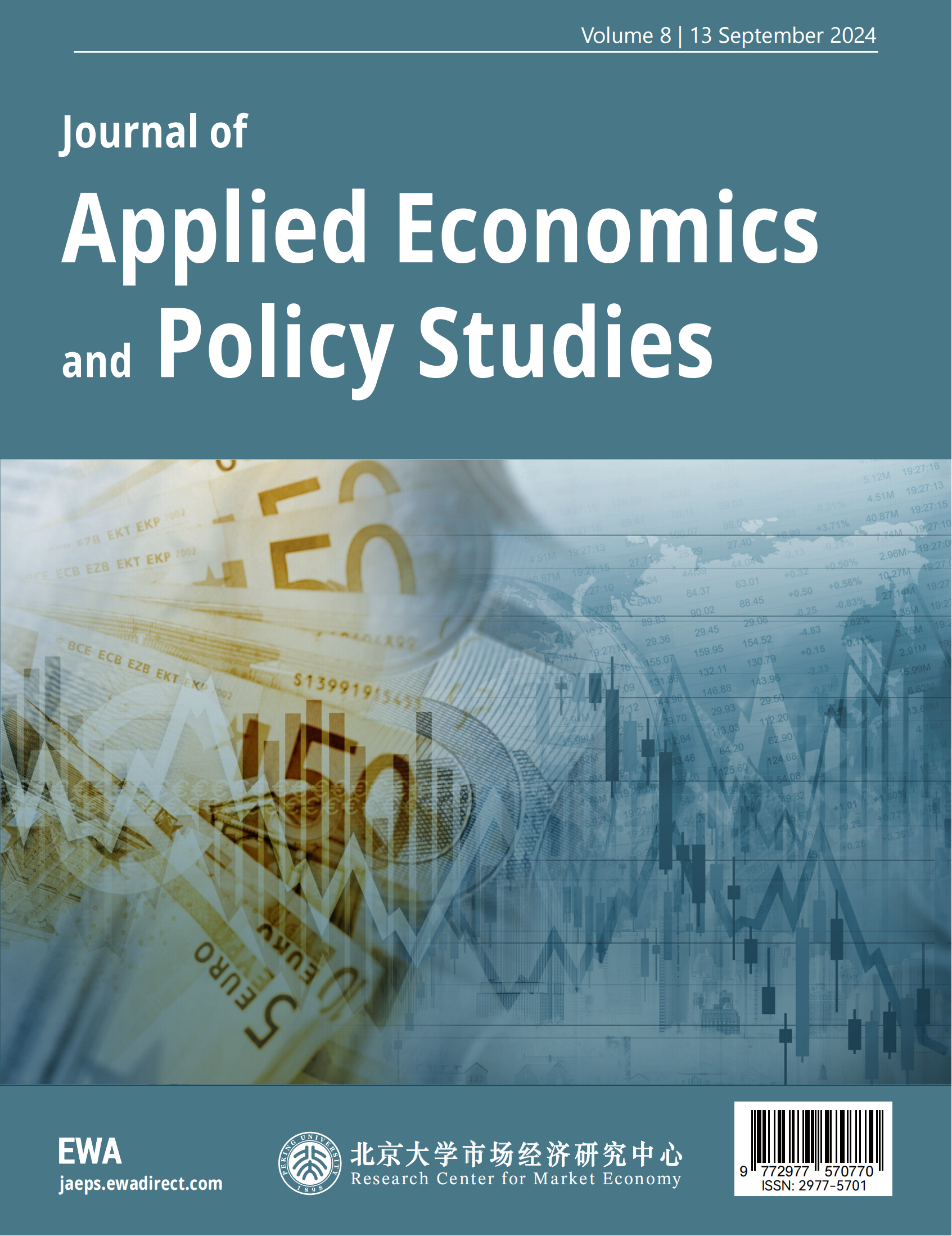1 Introduction
The 40th anniversary of China's reform and opening-up in 2021 marked a period of rapid economic growth and significant improvements in living standards. However, the development of civilization has not kept pace with economic progress. Civilization is often reflected in good lifestyle habits and moral values, encompassing aspects such as politics, economy, culture, history, and moral traditions. As citizens' quality of life and income levels rise, more people are inclined to travel, seeking to escape daily routines, broaden their horizons, and enjoy leisure activities. China has now entered the era of "mass tourism," characterized by increased tourist mobility, higher consumption levels, and more immersive travel experiences. [1] This surge in tourism has significantly boosted the economy but has also exposed uncivilized behaviours among tourists, especially in the self-media era. Enhancing the civilized tourism quality of Chinese tourists is crucial for the sustainable development of China's tourism industry. Key to this improvement is fostering self-control, self-regulation, and mutual influence among tourists. [2]
Unlike the "individualism" of Western cultures, China emphasizes an "interdependent self" and "social orientation," reflecting a "collectivism" culture. [3] Tourists often prioritize social relationships within their reference groups, which significantly influence their purchasing behaviours and intentions. Therefore, understanding the impact of reference groups on civilized tourism is essential. This research focuses on tourists visiting Beijing, examining self-perceived value as an internal variable and the influence of reference groups as an external variable. The aim is to develop a model that explores the external influences and internal mechanisms of civilized tourism among Chinese tourists, based on empirical research.
2 Theoretical Basis
2.1 Civilized Tourism
Civilized tourism refers to the display of civility in the emotions, attitudes, and behaviours of tourists, promoting harmonious coexistence between travellers and their environment. [4] It represents an advanced stage of tourism development and plays a crucial role in protecting ecological civilization. According to Guo Lufang and Zhang Su (2008), uncivilized behaviours among Chinese tourists can be categorized into three types: immoral behaviours, deviant behaviours, and prohibited behaviours. Immoral behaviours include actions like running red lights, making loud noises in public places, and neglecting public facilities, which violate social norms. Deviant behaviours encompass activities such as sexual misconduct and gambling, which can harm tourists' physical and mental health. Prohibited behaviours involve violating taboos and disrupting local customs, often due to cultural differences between tourists and residents.
As a reflection of a nation's soft power and competitiveness, civilized tourism showcases the civility of its citizens and is integral to the sustainable development of tourist destinations. In line with the ecological civilization goals set forth in the 14th Five-Year Plan and the guidance in "Xi Jinping: The Governance of China," it is essential to promote the concept of civilized tourism and enhance ecological and environmental awareness among the public.
2.2 Reference Group Influence
Achieving civilized tourism largely depends on the self-discipline of Chinese tourists. As consumers, such self-discipline can be achieving civilized tourism largely depends on the self-discipline of Chinese tourists, which aligns with the "social person" behaviour concept rooted in human relations theory, as introduced by G.E. Mayo's Hawthorne experiments. Mayo posited that people value not only economic relationships but also social relationships, with behaviour influenced by social norms and surrounding groups. Reference groups, which significantly shape individuals' behaviours, evaluations, and desires, are particularly influential in Chinese culture, which is characterized by collectivism. This cultural backdrop fosters the phenomenon of "following the trend," where consumers mimic the purchasing behaviours of their social circles, especially in uncertain and risky consumption situations. The "circle" culture in China further confines consumers within immediate social networks, such as family, friends, and acquaintances, enhancing the relevance of reference group theory.
Based on social comparison theory and conformity psychology, Park et al. (1997) identified three types of reference group influence: informational, utilitarian, and value expressive. Informational influence involves seeking product-related information from reference groups to mitigate consumption risks. Utilitarian influence is driven by the desire for approval or to avoid punishment, as consumers make choices based on the preferences and expectations of their reference groups. Value-expressive influence occurs when individuals adopt group values to enhance their image and maintain consistency within the group. Bearden et al.'s research suggests that value-expressive and utilitarian influences can be combined into normative influence, given their reflection of group values and norms and their high correlation.
This study will employ a modified version of Bearden et al.'s scale to measure these influences, tailored to the research objectives.
2.3 Perceived Value
Value is fundamental to human behavioural preferences, with consumers aiming to maximize value in their decisions. When purchasing products, they consider benefits and drawbacks, forming an overall evaluation that guides their choices. Consumer perceived value represents their subjective assessment of a product or service. This research area gained prominence in the 1990s through contributions from scholars like Zeithaml, Gale, Kotler, Sweeney, and Soutar, who highlighted that perceived value ultimately influences purchase decisions.
There are two main theoretical perspectives on perceived value. Zeithaml's comparison theory suggests that perceived value arises from weighing perceived benefits against costs. Sweeney and colleagues propose a four-dimensional framework: emotional, quality, social, and price value. Emotional value relates to the pleasure and satisfaction derived from a product or service. Quality value concerns the perceived utility based on the product's quality and performance. Social value involves recognition and self-image enhancement from consumption. Price value pertains to cost savings and efficiency. [5]
Chinese scholars, such as Fan Xiucheng, advocate combining quality and price value into functional value, particularly in tourism, where leisure and emotional experiences are key. In the context of tourism, travellers’ perception of civilized tourism value focuses on emotional fulfilment and social recognition. [6] Consequently, this study adopts a three-dimensional model of consumer perceived value, encompassing emotional, social, and functional values.
2.4 Relationship Among Reference Group Influence, Perceived Value, and Willingness for Civilized Tourism
Perceived value is a key factor in consumers' decision-making, reflecting their assessment of the intrinsic worth of a product or service. Reference groups, comprising individuals or collectives that shape an individual's views and behaviours, externally influence consumers' purchase intentions and decisions. Chinese consumers, influenced by Confucian, Taoist, and Buddhist traditions, are particularly sensitive to personal reputation and thus more influenced by social norms and others' opinions during consumption decisions.
Travelers' engagement in civilized tourism can be assessed based on their ability to derive emotional value (psychological satisfaction and pleasure), social value (social recognition and enhanced personal image), and functional value (smooth achievement of travel goals) through civilized behaviour. According to Carl Gustav Jung's personality theory, individuals may shed their social personas in certain environments, allowing suppressed desires to surface and potentially leading to unethical behaviour. The exotic and temporary nature of tourism can detach travellers from familiar social contexts, leading to "ethical detachment" or "abnormal behaviour," characterized by a weakened moral sense and explicit possessiveness. The herd mentality may exacerbate uncivilized behaviour among tourists.
The uncertainty of the non-routine environment in tourism makes tourists more susceptible to the influence of reference groups, such as family, friends, and travel companions. The civilized behaviour and opinions of these groups can reduce behavioural and consumption risks, restrain the potential for unethical behaviour, and encourage a willingness to engage in civilized tourism. [7] This study seeks to explore the intrinsic relationship between tourists' perceived value judgments, the influence of reference groups, and their willingness to participate in civilized tourism.
3 Research Design
3.1 Research Hypotheses
3.1.1 Reference Group Influence and Civilized Tourism
The study of individual behaviour in tourism activities and consumption necessitates consideration of the influence exerted by reference groups. Given the intangible, non-storable nature of services and the simultaneous production and consumption characteristics of most tourism products, tourists encounter elevated perceived risks as consumers. [8] These product characteristics complicate the evaluation and decision-making processes, rendering information searches more challenging compared to those for tangible products. Consequently, travellers frequently depend on reference groups, such as family and friends, to obtain pertinent travel and product information. Furthermore, to maintain harmonious interpersonal relationships and avoid socially inappropriate behaviours, individuals often conform to the behavioural norms and standard consumption patterns prevalent within their social groups. [9, 10] In this context, the recommendations provided by a traveller’s reference group serve as important criteria for selecting travel methods and acquiring relevant information.
Based on the aforementioned considerations, the study posits the following hypothesis (see Figure 1):
Hypothesis H1: The influence of reference groups has a significant positive impact on tourists' civilized tourism behaviour and willingness.
-H1a: Informational influence has a significant positive impact on tourists' civilized tourism behaviour and willingness.
-H1b: Normative influence has a significant positive impact on tourists' civilized tourism behaviour and willingness.
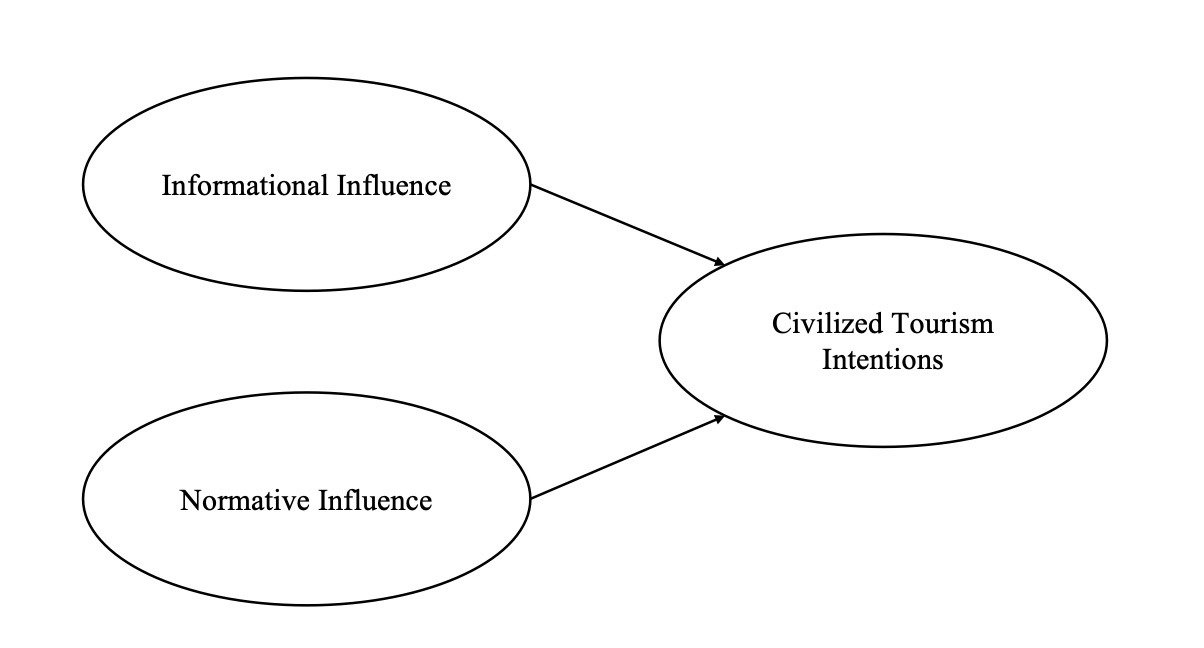
Figure 1. Hypothetical Framework Diagram of the Influence of Reference Groups on Tourists' Willingness to Travel Civilly.
3.1.2 Perceived Value and Willingness for Civilized Tourism
The primary criterion for consumers when choosing a product or service is its ability to provide the greatest value. [11] Previous studies have identified perceived value as a critical determinant of consumers' purchase intentions. Thus, the extent to which civilized tourism can offer tourists the following types of value will significantly influence their decision to engage in such tourism: a pleasant and satisfying experience (emotional value); a safe and convenient experience (functional value); and social recognition or an enhanced self-image within a group (social value). Based on these considerations, the study proposes the following hypothesis (see Figure 2):
Hypothesis H2: Perceived value has a significant positive impact on tourists' civilized tourism behaviour and willingness.
-H2a: Emotional value has a significant positive impact on tourists' civilized tourism behaviour and willingness.
-H2b: Functional value has a significant positive impact on tourists' civilized tourism behaviour and willingness.
-H2c: Social value has a significant positive impact on tourists' civilized tourism behaviour and willingness.
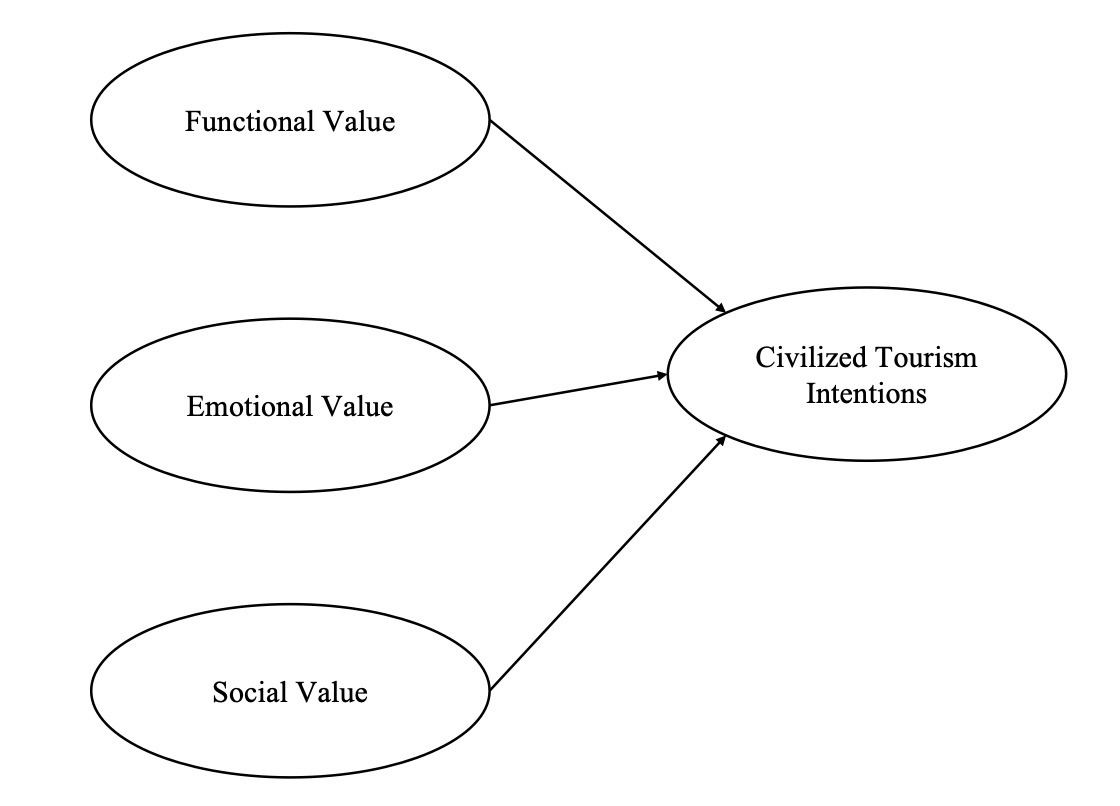
Figure 2. Hypothetical Framework of the Influence of Perceived Value on Tourist Intentions for Civilized Tourism
3.1.3 Reference Group Influence and Perceived Value of Civilized Tourism
There is a significant relationship between reference group influence and the perceived value of civilized tourism. [12] The exchange of information within reference groups can enhance the transmission of product value attributes. [13] The informational influence exerted by reference groups can lead consumers to perceive others' behaviours as correct standards, resulting in sincere conformity and private acceptance. [14] Given travellers’ limited knowledge and consumption experience regarding tourism destinations, information provided by reference groups often serves as a foundational basis for their behaviours. Consequently, under the influence of reference groups, travellers may develop a better understanding of civilized tourism and form a perception of its value. Based on this premise, the study proposes the following hypothesis (see Figure 3):
Hypothesis H3a: Informational influence has a significant positive impact on tourists' perceived value of civilized tourism.
The normative influence of reference groups often compels individuals to align their beliefs and behaviours with the group. Individuals may engage in civilized tourism due to social pressure, motivated by the desire for praise or the fear of punishment from their reference group, thereby fostering perceptions of social value such as conformity, ostentation, and competition. [15] Consequently, the study proposes the following hypothesis:
Hypothesis H3b: Normative influence has a significant positive impact on the perceived value of civilized tourism.
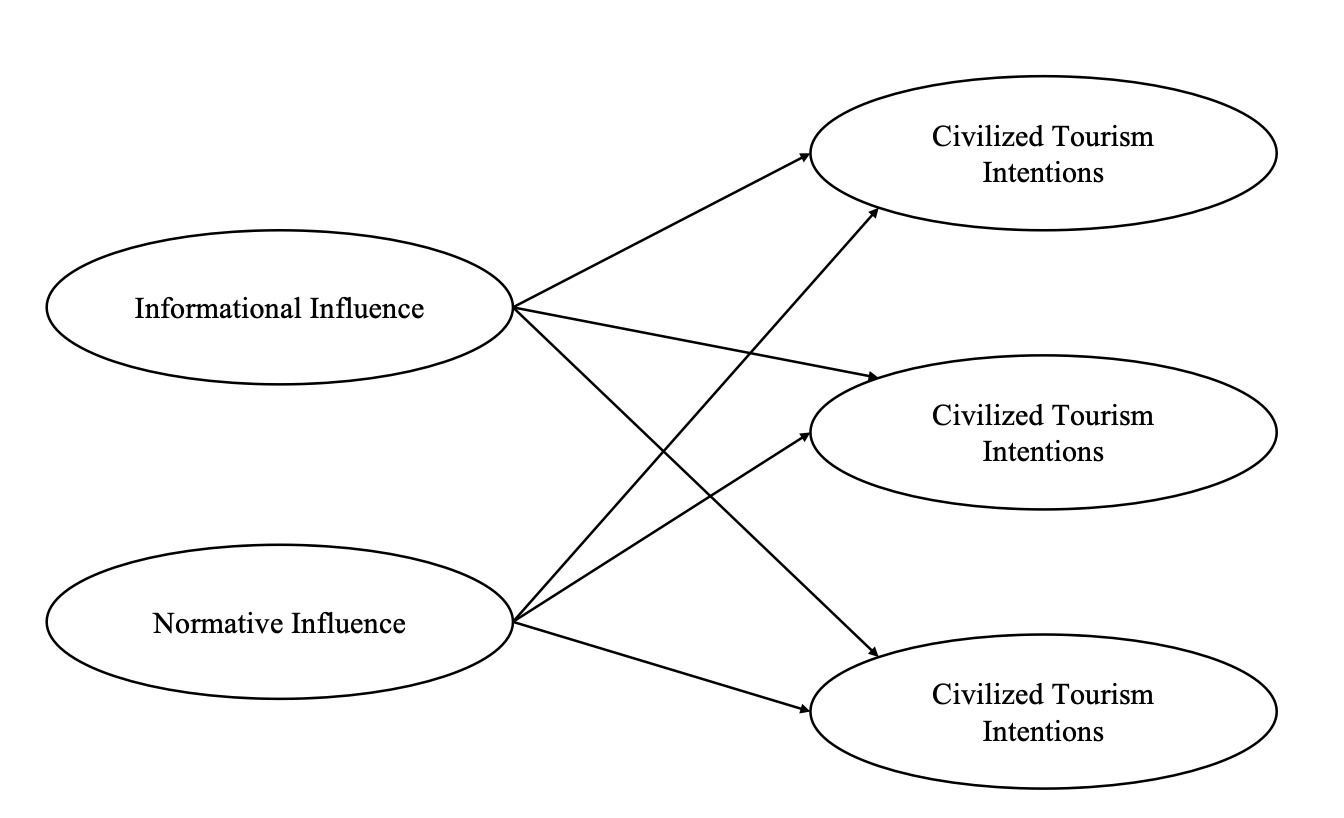
Figure 3. Hypothetical Framework of the Relationship Between Reference Group Influence and Perceived Value in Civilized Tourism
3.2 Questionnaire Development
The questionnaire used in this study is a structured survey consisting of four main sections. The first section addresses the socio-demographic characteristics of respondents. The second section examines their willingness and attitudes towards civilized tourism. The third section evaluates the influence of reference groups, and the final section measures the perceived value of civilized tourism. The first section uses a combination of multiple-choice and fill-in-the-blank questions, while the subsequent sections employ a Likert five-point scale, with responses ranging from 1 (strongly disagree) to 5 (strongly agree).
Perceived value in civilized tourism is assessed using Sweeney's Perceived Value Scale. [16] The impact of reference groups is evaluated through an adapted version of Bearden et al.'s scale, modified for this study. [17] The socio-demographic section collects data on gender, age, education level, occupation, and income. The section on respondents' cognition and attitudes towards civilized tourism is based on Wang Jianming's Resource Conservation Awareness Scale.
3.3 Data Collection
The study selects Beijing as the case study site for two key reasons. First, as China's capital, Beijing is a major political, economic, and cultural centre. It boasts seven World Heritage sites—the most of any city worldwide—and is the only mainland Chinese city among the top 15 global shopping capitals, with over 100 large and medium-sized shopping malls. In 2023, Beijing attracted 329 million visitors, making it a representative and typical location for this case study. Second, as a national symbol, Beijing amplifies any instances of uncivilized tourist behaviour in the age of new media. Using Beijing as a case study facilitates the identification and resolution of these issues, positioning the city as a leader in promoting civilized tourism and setting an example for others.
The research was conducted from January 1, 2024, to March 5, 2024. Online surveys were distributed through the Questionnaire Star platform. Out of 450 surveys sent, 378 valid responses were received, resulting in an effective response rate of 84%.
3.4 Sample Analysis
Table 1 presents the statistical results concerning the socio-demographic characteristics of the sample. The gender distribution is relatively balanced, with males constituting 51.06% and females 48.94%. The majority of respondents are aged 35-44 years (41.53%), followed by those aged 25-34 years (33.07%). A significant portion, 63.76%, holds a college degree or higher. Monthly income is most commonly between 3001-5000 yuan, reported by 50.79% of respondents. Occupationally, workers and individual business operators are predominant, representing 28.31% and 25.4% of the sample, respectively.
The survey on tourism patterns in Beijing indicates that entertainment and visiting relatives are the primary travel motivations, accounting for 32.01% and 28.84%, respectively. Respondents reported witnessing uncivilized behaviours such as loud noise (65.45%), vandalism (46.56%), and littering (41.27%) during their travels in Beijing. Regarding intervention, 44.97% of respondents expressed a willingness to actively prevent uncivilized behaviours, while 32.8% preferred to avoid conflict and remain uninvolved.
Table 1. Sample Statistical Description
Variable |
Option |
Percentage (%) |
Gender |
Male |
51.06 |
Female |
48.94 |
|
Monthly Income |
<3000 Yuan |
21.69 |
3001 – 5000 Yuan |
50.79 |
|
> 8000 Yuan |
4.23 |
|
Age |
25 and below |
14.55 |
25 – 34 years |
33.07 |
|
35 – 44 years |
41.53 |
|
45 – 54 years |
9.79 |
|
55 and above |
1.06 |
|
Occupation |
Government/ Enterprise Staff |
9.26 |
Self-Employed |
25.4 |
|
Worker |
28.31 |
|
Professional/Technical/Cultural Staff |
9.52 |
|
Student |
11.9 |
|
Others |
2.65 |
|
Education Level |
Junior High and below |
7.41 |
High School |
25.13 |
|
College and Undergraduate |
63.76 |
|
Master’s and above |
3.7 |
|
Tourist Misconducts Witnessed in Beijing |
Littering |
41.27 |
Loud Talking |
65.34 |
|
Damaging Public Property |
46.56 |
|
Spitting |
37.57 |
|
Smoking in Public |
32.28 |
|
Disobeying Orders |
24.87 |
|
Purpose of Travel to Beijing |
Entertainment |
32.01 |
Visiting Relatives |
28.84 |
|
Study Tour |
20.63 |
|
Business Trip |
6.35 |
|
Others |
1.59 |
4 Results and Analysis
4.1 Reliability and Validity
The Cronbach's Alpha coefficient was used to evaluate the reliability of the scale, with an Alpha value above 0.8 indicating high reliability. In this study, the Cronbach's Alpha value was 0.888, demonstrating acceptable scale reliability.
For validity assessment, the focus was on construct validity. Exploratory factor analysis yielded a KMO value of 0.827. Bartlett's test of sphericity showed a value of 649.786, with 120 degrees of freedom and a p-value less than 0.05 (p=0.000). The cumulative variance contribution rate was 54.769%, exceeding the 50% threshold. These results confirm the scale's satisfactory validity and suitability for factor analysis.
4.2 Hypothesis Testing
4.2.1 Reference Group Influence and Willingness for Civilized Tourism
This study utilized structural equation modelling to examine the impact of reference group effects on tourists' willingness to engage in civilized travel (see Figure 4 and Table 2). The standardized path coefficients were 1.382 and 1.212, both greater than 0, indicating significant correlations at the 0.01 level (z1=2.888, z2=2.872, p1=p2=0.004<0.01). These results demonstrate that both types of reference group influences have a substantial positive effect on tourists' civilized tourism behaviour and willingness, thereby supporting Hypothesis H1.
4.2.2 Perceived Value and Willingness for Civilized Tourism
After multiple fittings and adjustments of the structural equation model, the effects of perceived values—functional, emotional, and social—on tourists' willingness to engage in civilized travel were assessed (see Figure 5 and Table 3). The results indicate that tourists' perceptions of civilized tourism significantly influence their behaviour and willingness to participate in such activities (p < 0.01). These findings support the validity of Hypotheses H2a, H2b, and H2c.
4.2.3 Reference Group Influence and Perceived Value of Civilized Tourism
After multiple fittings and modifications of the structural equation model, the impact of reference group effects on tourists' perceived value of civilized tourism was assessed (see Figure 6 and Table 4). Both informational and normative influences significantly positively affect tourists' functional, emotional, and social perceived values of civilized tourism (p < 0.01). These results confirm the validity of Hypotheses H3a and H3b.
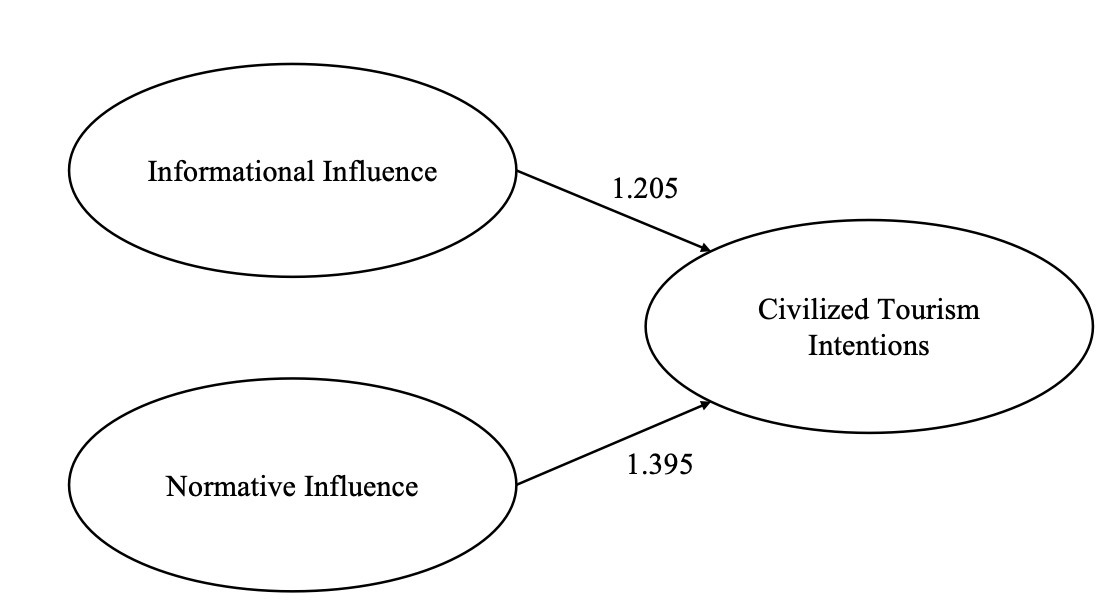
Figure 4. Relationship Model Between Reference Group Influence and Tourist Intentions for Civilized Tourism
Table 2. Results of the Impact of Reference Group Influence on Tourist Civilized Tourism Behaviour and Intentions
X→Y |
Unstandardized Path Coefficient |
SE |
z (CR Value) |
p |
Standardized Path Coefficient |
Informational Influence → Civilized Tourism Intentions |
1.333 |
0.333 |
3.999 |
0 |
1.205 |
Normative Influence → Civilized Tourism Intentions |
1.628 |
0.563 |
2.892 |
0.004 |
1.395 |
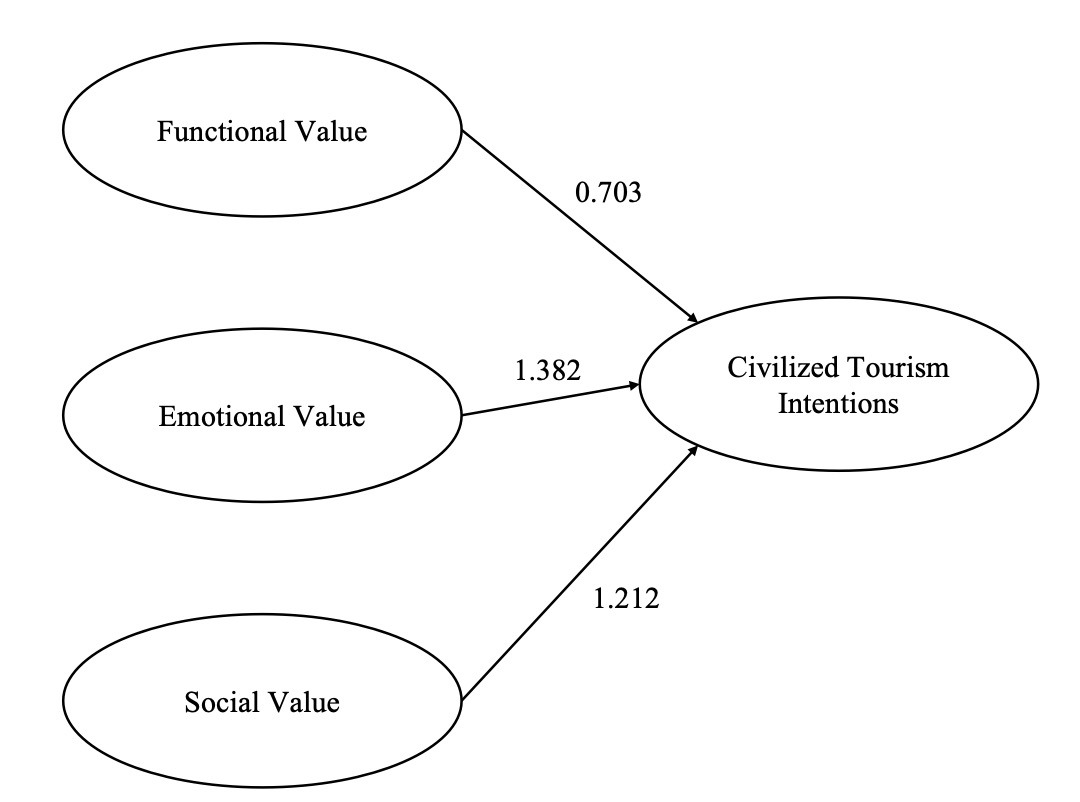
Figure 5. Relationship Model Between Tourist Self-Value Judgment and Civilized Tourism Intentions
Table 3. Results of the Impact of Self-Value Judgment on Tourist Civilized Tourism Behaviour and Intentions
X→Y |
Unstandardized Path Coefficient |
SE |
z (CR Value) |
p |
Standardized Path Coefficient |
Functional Value of Civilized Tourism → Civilized Tourism Intentions |
0.39 |
0.076 |
5.106 |
0 |
0.703 |
Emotional Value of Civilized Tourism → Civilized Tourism Intentions |
1.459 |
0.505 |
2.888 |
0.004 |
1.382 |
Social Value of Civilized Tourism → Civilized Tourism Intentions |
1.27 |
0.442 |
2.872 |
0.004 |
1.212 |
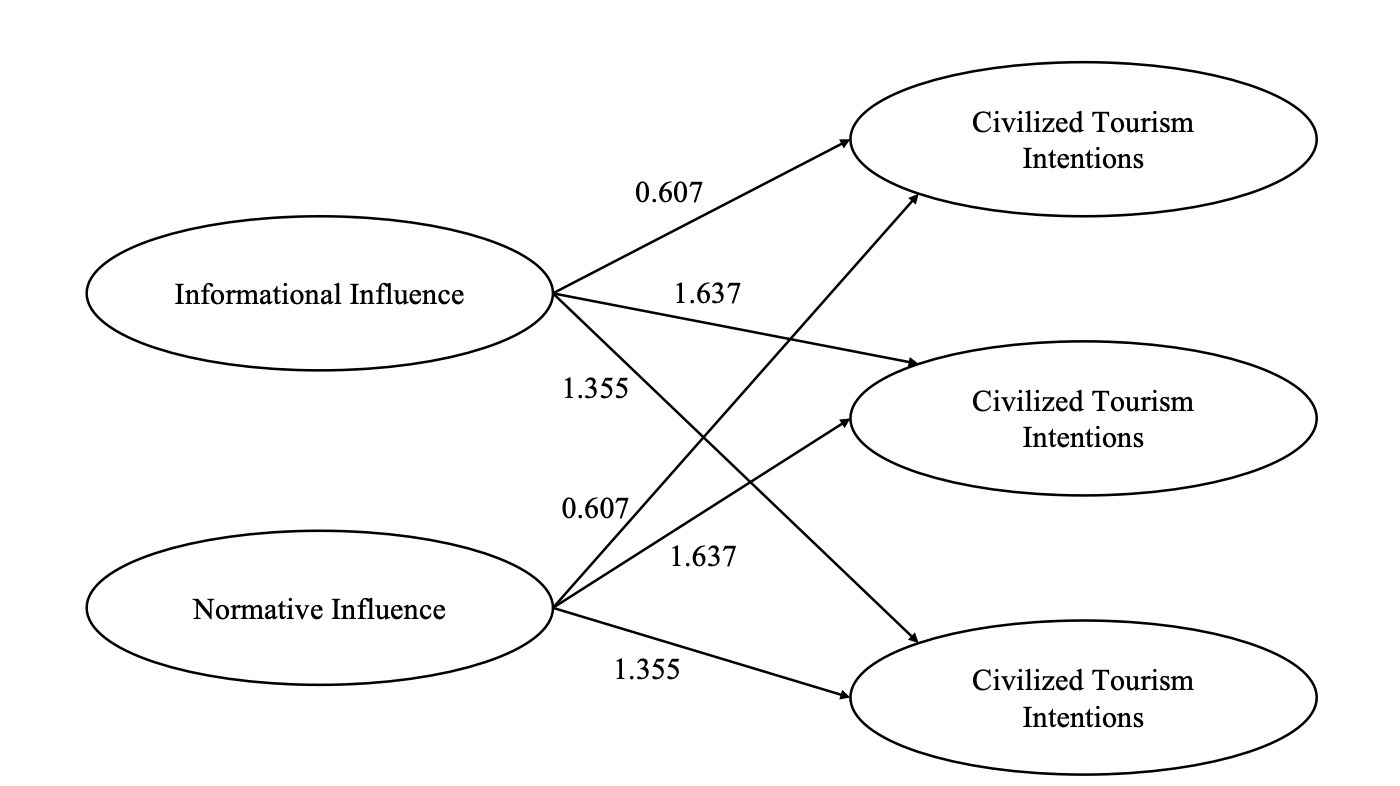
Figure 6. Relationship Model Between Reference Group Influence and Perceived Value in Civilized Tourism
Table 4. Results of the Impact of Reference Group Influence on Perceived Value in Civilized Tourism
X→Y |
Unstandardized Path Coefficient |
SE |
z (CR Value) |
p |
Standardized Path Coefficient |
Normative Influence →Functional Value of Civilized Tourism |
1.687 |
0.537 |
3.142 |
0.002 |
0.607 |
Normative Influence → Emotional Value of Civilized Tourism |
1.808 |
0.491 |
3.683 |
0 |
1.637 |
Normative Influence → Social Value of Civilized Tourism |
1.632 |
0.47 |
3.475 |
0.001 |
1.355 |
Informational Influence →Functional Value of Civilized Tourism |
1.687 |
0.537 |
3.142 |
0.002 |
0.607 |
Informational Influence → Emotional Value of Civilized Tourism |
1.808 |
0.491 |
3.683 |
0 |
1.637 |
Informational Influence → Social Value of Civilized Tourism |
1.632 |
0.47 |
3.475 |
0.001 |
1.355 |
5 Results and Analysis
5.1 Basic Conclusions
This study examined the influence mechanism of reference group effects and perceived value judgment theory on tourists' choice of civilized tourism through a survey of tourists visiting Beijing. The key findings are as follows:
1 From the microscopic perspective of individual tourists, committing to learning and deeply understanding the connotation of civilized tourism will facilitate the formation of their civilized tourism behaviours and willingness. Chinese culture emphasizes the concepts of 'interdependent self' and 'social orientation,' while the 'collectivism' culture instils in Chinese consumers a strong sense of 'saving face.' In the context of tourism and consumption, this translates to Chinese tourists placing significant importance on expressing their self-awareness and characteristics through their behavioural patterns and consumption decisions to their affiliated groups and society. This, in turn, influences how others perceive and evaluate them. Through the application of a constructive structural equation model, this study empirically demonstrates that civilized tourism carries substantial social value. Tourists should recognize that civilized tourism positively impacts their self-image within reference groups and society, ultimately aiding in gaining positive social recognition. Hence, it is imperative for tourists to comprehend the true value of civilized tourism and make informed behaviour choices.
(2) Tourists' perceived value of civilized tourism has a notable positive effect on their related behaviours and willingness. When tourists recognize the benefits of civilized tourism, such as enjoying the travel experience, building a positive social image, and gaining social recognition, they are more likely to engage in it. However, if they perceive it as not cost-effective or failing to meet their expectations, they may be less inclined to control uncivilized behaviours.
(3) The role of reference group effects on tourists' perceived value of civilized tourism can be categorized into two aspects. Firstly, informational influence plays a significant positive role. As tourists are in an unfamiliar environment during travel, their perception of civilized tourism is primarily shaped by references from family, friends, and peers. This information sharing enhances their understanding and appreciation of civilized tourism's value. Secondly, normative influence also has a considerable positive impact. Members of reference groups convey behavioural norms and attitudes to individuals, triggering conformity, show-off, and comparison value perceptions. Additionally, normative influence deepens individuals' comprehension of civilized tourism and its value.
5.2 Managerial Implications
(1) From the microscopic perspective of individual tourists, committing to learning and deeply understanding the connotation of civilized tourism will facilitate the formation of their civilized tourism behaviours and willingness. Chinese culture emphasizes the concepts of 'interdependent self' and 'social orientation,' while the 'collectivism' culture instils in Chinese consumers a strong sense of 'saving face'. [18] In the context of tourism and consumption, this translates to Chinese tourists placing significant importance on expressing their self-awareness and characteristics through their behavioural patterns and consumption decisions to their affiliated groups and society. This, in turn, influences how others perceive and evaluate them. Through the application of a constructive structural equation model, this study empirically demonstrates that civilized tourism carries substantial social value. Tourists should recognize that civilized tourism positively impacts their self-image within reference groups and society, ultimately aiding in gaining positive social recognition. Hence, it is imperative for tourists to comprehend the true value of civilized tourism and make informed behaviour choices.
(2) From the macroscopic viewpoint of administrative departments, the reference group theory can be strategically employed to shape tourists' preferences towards civilized tourism. This involves two primary strategies: Firstly, selecting effective communication channels and leveraging the power of mass media to guide public opinion. This can be achieved by inviting renowned individuals or popular celebrities to feature in civilized tourism promotional videos or brochures and appointing them as civilized tourism ambassadors. Through their influence and appeal, the emotional and social values of civilized tourism can be effectively conveyed. By integrating traditional and new media, people can be educated on the profound benefits that civilized tourism brings to individuals, society, and the nation. This holistic approach aids in fostering a willingness towards civilized tourism. Secondly, there is a need to seamlessly integrate the values of civilized tourism, marketing segmentation of consumer groups, and the distinctive characteristics of Chinese personalities. This synergy can significantly enhance the appeal of civilized tourism to consumers. Administrative departments and enterprises should delve into ways to align Chinese tourists' personality traits with the social value of civilized tourism. By precisely targeting stimuli that resonate with Chinese tourists, such as the desire to 'save face,' seek social recognition, and elevate their self-image, and associating these with civilized tourism, we can effectively elevate the level of civilized tourism literacy among Chinese tourists.
5.3 Theoretical Contributions, Limitations, and Future Directions
The theoretical contributions of this study can be summarized as follows: Firstly, by constructing a model that examines the role of reference groups and perceived value in civilized tourism, this study has investigated the underlying mechanisms that drive tourists' civilized behaviour. This approach has enriched both the content and the perspective of research in the field of civilized tourism. Secondly, the study has conducted an analysis comparing the differential impacts of three distinct types of perceived value on tourists' willingness to engage in civilized tourism and their actual behaviour.
However, this study also acknowledges certain limitations. Due to space constraints, a detailed analysis of the specific nature of tourists' civilized tourism behaviour was not included. Future studies could explore this aspect further by conducting a more in-depth variable analysis of civilized tourism characteristics. Additionally, the current study did not comprehensively account for the personality traits of survey respondents, which is a factor that could be more thoroughly examined in subsequent research. Lastly, the potential differences in the influence of reference groups and value judgments between domestic and outbound tourism were not considered. This represents an important area for future investigation, particularly in the context of outbound travel.
References
[1]. Gao, M., & He, W. (2020, January 23). Constructing a model and empirical study on the enhancement of national cultural soft power through civilized tourism: A case study of Chinese tourists in the Angkor area of Cambodia. Tourism Forum.
[2]. Yang, J. D., & Qin, X. F. (2000). Sustainable consumption as a mechanism for achieving sustainable development. Contemporary Finance & Economics, 6, 13-18.
[3]. Zhang, X. A. (2010). The formation mechanism of customer value for Chinese consumers: An empirical study on mobile phones. Management World, 2010(1), 107-121.
[4]. Chen, Y. S. (2017, April 23). Discussion on the approaches to implementing civilized tourism in the context of all-for-one tourism. Modern Economic Information.
[5]. Childers, T. L., & Rao, A. R. (1992). The influence of familial and peer-based reference groups on consumer decisions. Journal of Consumer Research, 19(2), 198-211.
[6]. Rokeach, M. (1973). The nature of human values. The Free Press.
[7]. Dong, D. H. (2003). Research on the theory and method of building competitive advantage based on customer value (Doctoral dissertation, Dalian University of Technology, Dalian, China).
[8]. Fan, X. C., & Luo, H. C. (2003). Analysis of the competitiveness of service enterprises based on customer perceived value. Nankai Business Review, 2003(6), 41-45.
[9]. Luo, W. B. (2016, November 22). The evolutionary process and multi-perspective interpretation of civilized tourism in China. China Tourism News.
[10]. Mehta, S. C., Lalwani, A. K., & Ping, L. (2001). Reference group influence and perceived risk in services among working women in Singapore: A replication and extension. Journal of International Consumer Marketing, 14(1), 43-65.
[11]. Rook, D. W., & Fisher, R. J. (1995). Normative influences on impulsive buying behaviour. Journal of Consumer Research, 22(3), 305-313.
[12]. Zhang, Z. L., & Zhuang, G. J. (2008). A study of impulsive buying from the perspectives of social influence and face. Management Science, 21(6), 66-72.
[13]. Wang, H. (2013). Research on brand loyalty under the influence of reference groups based on perceived value: A case study of luxury brands (Master’s thesis, Chongqing Technology and Business University, Chongqing, China).
[14]. Jiang, L., Zhou, T. R., & Wang, C. Z. (2009). Luxury brands versus mass market brands: Differences in the influence of reference groups in purchase decision making. Forecasting, 28(4), 8-15.
[15]. Midgley, D. F. (1983). Patterns of interpersonal information seeking for the purchase of a symbolic product. Journal of Marketing Research, 20(1), 74-83.
[16]. Sweeney, J. C., & Soutar, G. N. (2001). Consumer perceived value: The development of a multiple item scale. Journal of Retailing, 77(2), 203-220.
[17]. Bearden, W. O., Netemeyer, R. G., & Teel, J. E. (1989). Measurement of consumer susceptibility to interpersonal influence. Journal of Consumer Research, 15(4), 473-481.
[18]. Gu, H. M. (2007). The spirit of the Chinese people (3rd ed.). Hainan Publishing House.
Cite this article
Wei,T. (2024). The Impact of Reference Group Influence and Self-Value Judgment on Civilized Tourism Behaviour. Journal of Applied Economics and Policy Studies,8,9-18.
Data availability
The datasets used and/or analyzed during the current study will be available from the authors upon reasonable request.
Disclaimer/Publisher's Note
The statements, opinions and data contained in all publications are solely those of the individual author(s) and contributor(s) and not of EWA Publishing and/or the editor(s). EWA Publishing and/or the editor(s) disclaim responsibility for any injury to people or property resulting from any ideas, methods, instructions or products referred to in the content.
About volume
Journal:Journal of Applied Economics and Policy Studies
© 2024 by the author(s). Licensee EWA Publishing, Oxford, UK. This article is an open access article distributed under the terms and
conditions of the Creative Commons Attribution (CC BY) license. Authors who
publish this series agree to the following terms:
1. Authors retain copyright and grant the series right of first publication with the work simultaneously licensed under a Creative Commons
Attribution License that allows others to share the work with an acknowledgment of the work's authorship and initial publication in this
series.
2. Authors are able to enter into separate, additional contractual arrangements for the non-exclusive distribution of the series's published
version of the work (e.g., post it to an institutional repository or publish it in a book), with an acknowledgment of its initial
publication in this series.
3. Authors are permitted and encouraged to post their work online (e.g., in institutional repositories or on their website) prior to and
during the submission process, as it can lead to productive exchanges, as well as earlier and greater citation of published work (See
Open access policy for details).
References
[1]. Gao, M., & He, W. (2020, January 23). Constructing a model and empirical study on the enhancement of national cultural soft power through civilized tourism: A case study of Chinese tourists in the Angkor area of Cambodia. Tourism Forum.
[2]. Yang, J. D., & Qin, X. F. (2000). Sustainable consumption as a mechanism for achieving sustainable development. Contemporary Finance & Economics, 6, 13-18.
[3]. Zhang, X. A. (2010). The formation mechanism of customer value for Chinese consumers: An empirical study on mobile phones. Management World, 2010(1), 107-121.
[4]. Chen, Y. S. (2017, April 23). Discussion on the approaches to implementing civilized tourism in the context of all-for-one tourism. Modern Economic Information.
[5]. Childers, T. L., & Rao, A. R. (1992). The influence of familial and peer-based reference groups on consumer decisions. Journal of Consumer Research, 19(2), 198-211.
[6]. Rokeach, M. (1973). The nature of human values. The Free Press.
[7]. Dong, D. H. (2003). Research on the theory and method of building competitive advantage based on customer value (Doctoral dissertation, Dalian University of Technology, Dalian, China).
[8]. Fan, X. C., & Luo, H. C. (2003). Analysis of the competitiveness of service enterprises based on customer perceived value. Nankai Business Review, 2003(6), 41-45.
[9]. Luo, W. B. (2016, November 22). The evolutionary process and multi-perspective interpretation of civilized tourism in China. China Tourism News.
[10]. Mehta, S. C., Lalwani, A. K., & Ping, L. (2001). Reference group influence and perceived risk in services among working women in Singapore: A replication and extension. Journal of International Consumer Marketing, 14(1), 43-65.
[11]. Rook, D. W., & Fisher, R. J. (1995). Normative influences on impulsive buying behaviour. Journal of Consumer Research, 22(3), 305-313.
[12]. Zhang, Z. L., & Zhuang, G. J. (2008). A study of impulsive buying from the perspectives of social influence and face. Management Science, 21(6), 66-72.
[13]. Wang, H. (2013). Research on brand loyalty under the influence of reference groups based on perceived value: A case study of luxury brands (Master’s thesis, Chongqing Technology and Business University, Chongqing, China).
[14]. Jiang, L., Zhou, T. R., & Wang, C. Z. (2009). Luxury brands versus mass market brands: Differences in the influence of reference groups in purchase decision making. Forecasting, 28(4), 8-15.
[15]. Midgley, D. F. (1983). Patterns of interpersonal information seeking for the purchase of a symbolic product. Journal of Marketing Research, 20(1), 74-83.
[16]. Sweeney, J. C., & Soutar, G. N. (2001). Consumer perceived value: The development of a multiple item scale. Journal of Retailing, 77(2), 203-220.
[17]. Bearden, W. O., Netemeyer, R. G., & Teel, J. E. (1989). Measurement of consumer susceptibility to interpersonal influence. Journal of Consumer Research, 15(4), 473-481.
[18]. Gu, H. M. (2007). The spirit of the Chinese people (3rd ed.). Hainan Publishing House.





